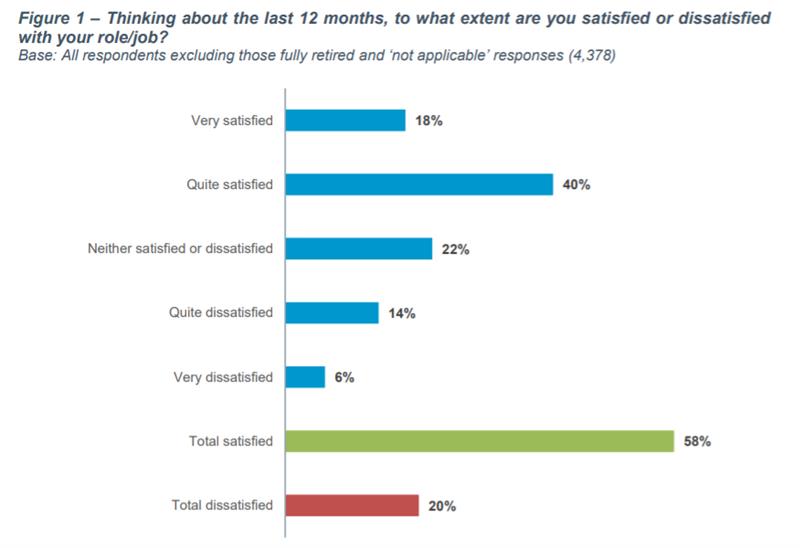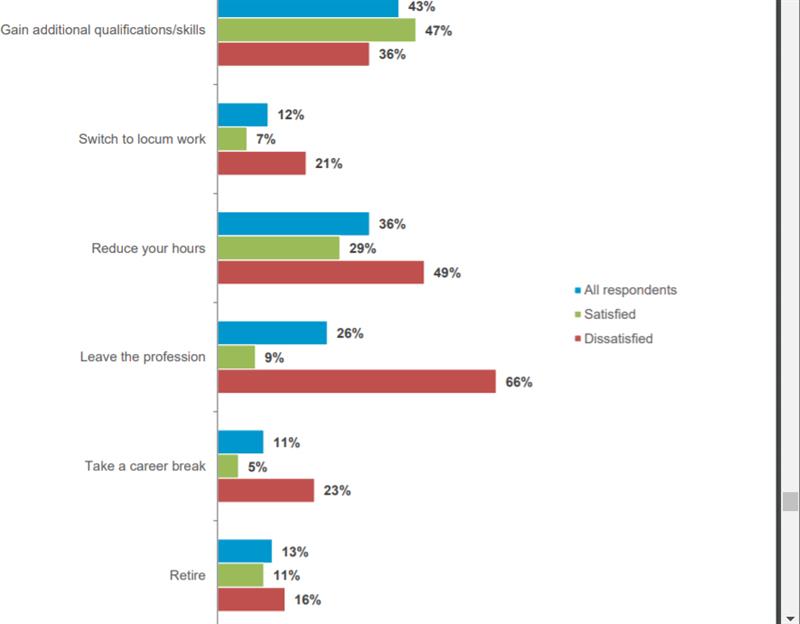
Dissatisfaction among optical professionals has led many to consider a career change, according to further analysis of the General Optical Council’s 2021 registrant survey.
The regulator commissioned additional work on its survey to better understand what the optical workforce in the UK could look like in the future.
It explained survey findings were scaled up to offer an approximation of the number of registrants who may have answered in a particular way and to inform future workplace planning.
Analysis was conducted to highlight differences in the results between subgroups, which included registration type, workplace setting, involvement in enhanced eye care services, working status, location, gender and age group.
Sourcing satisfaction
The GOC’s registrant survey was originally published in July and received 4,880 responses (Optician 16/7/21). Of the respondents, 56% were optometrists, 25% were dispensing opticians and 21% were students.
One of the questions that was selected for further analysis asked about how satisfied or dissatisfied registrants were in their role in the context of the past 12 months.
In further analysis, the GOC’s scaled up numbers found approximately 17,000 registrants (58%) who said they were satisfied in their current role, with 18% very satisfied and 40% quite satisfied. The regulator also found 20% (5,900) who were either quite dissatisfied (14%) or very dissatisfied (6%), as well as 22% (6,500) who were neither satisfied nor dissatisfied.
 "Thinking about the last 12 months, to what extent are you satisfied or dissatisfied with your role/job?"
"Thinking about the last 12 months, to what extent are you satisfied or dissatisfied with your role/job?"
Further analysis identified how subgroups responded. Fifty-seven percent of optometrists said they were satisfied, 60% of dispensing opticians, 59% of student optometrists and 61% of student dispensing opticians, with just 47% of locums who were satisfied.
Optometrists (22%) and 18% of dispensing opticians were the most dissatisfied when job roles were compared, while those who worked in a multiple (23%) or in domiciliary care (27%) were more likely to be dissatisfied, as well as locums (28%).
In terms of workplace settings, satisfaction at independent practices was 10% higher than multiples (63% and 53% respectively), with those working in a hospital the most satisfied (66%), as well as those in education and academia on 63%.
Dissatisfaction rates in workplace settings did not vary greatly, although domiciliary care scored highest with 27%, followed by multiples on 23%, independents (19%), hospital (14%) and 12% for education and academia.
The GOC noted that other satisfied subgroups included practitioners involved in the delivery of enhanced eye care services, although there was little difference to those not involved in enhanced services (61% and 57% satisfied, respectively). The rates of dissatisfaction were equal at 20%.
Registrants in full time employment were the most satisfied (64%) compared to 55% in part-time roles, and 35% of those not working, unemployed or retired. Dissatisfaction rates were comparably low for full-time (17%) and part-time (22%) while dissatisfaction was reported by 32% of those not working, unemployed or retired.
Practitioners based in London were least likely to be satisfied (50%) and when compared to the other regions it was notably low, with the others at 57% or higher. Dissatisfaction rates in London were also the highest at 23%, although percentages for most other categories were not much lower.
There was not much difference in job satisfaction by gender with 58% and 59% satisfied respectively for male and female respondents, with both 20% dissatisfied.
Satisfaction increased slightly by age group from 56% for 18 to 34-year-olds, 58% for 35 to 54 and 63% for 55 and over, while dissatisfaction across the age groups was similar (20%, 21% and 17%, respectively).
Changing things up
The GOC asked registrants if they had considered making changes to their career over the next 12 to 24 months and noted that many of these changes were driven by dissatisfaction.
A list of options for respondents to choose from was provided, which included gaining additional qualifications, switching to locum work and leaving the profession.
 "Have you considered making any of the following changes to your career over the next 12 to 24 months?"
"Have you considered making any of the following changes to your career over the next 12 to 24 months?"
Approximately 12,600 (43%) said they had plans to gain additional qualifications over the next 12 to 24 months, which was the most selected category. Those more likely to consider upskilling were optometrists (45%); student optometrists (50%) and student dispensing opticians (56%); practitioners who worked for a multiple (49%) compared to 37% at an independent, or 55% at a hospital; full-time workers (47%); and those who work in Wales (50%).
Demographically, 45% of female registrants said they had considered additional qualifications compared to 40% of male registrants. Fifty-eight percent of those in the 18 to 34 age category said they were likely to upskill, compared to 46% of 35 to 54-year-olds.
Of the 10,600 registrants (36%) who planned to reduce their hours over the next 12 to 24 months, the most likely to do so were: optometrists (40%), registrants involved in the delivery of enhanced eye care services (39%) compared to 34% of those not involved; those who worked full-time or as locums (both 38%); and those aged 55 and over (42%) compared to 34% for the other two age categories.
There were 7,600 respondents (26%) who planned to leave the profession with the following sub groups more likely to do so: 30% of dispensing opticians; domiciliary practitioners (32%); locums (36%) or those currently not working, unemployed or retired (39%); London based registrants (30%); and people aged 35 to 54 (30%).
A small proportion of respondents (13%) said they intended to retire with those working in an independent setting (19%) or in part-time roles (18%) more likely to do so, as well as male registrants (20%) and people aged 55 or over (44%).
Locum work was considered by 12% of respondents and a career break was planned by 11% of registrants, with the most likely to do so working at a multiple, not currently working, in London, and people aged 18 to 34.
